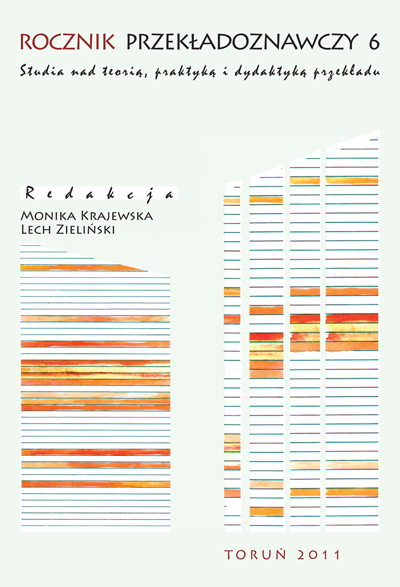Norm and quality of particle translation on the example of instruction manuals and linguistic texts
DOI:
https://doi.org/10.12775/RP.2011.004Keywords
particle, translation, contrastive linguistics, normAbstract
This paper discusses the differences between German and Polish in particle translation. It attempts at the discussion on the role of German particles from the synchronic translation perspective. As we know, specialist language differs from general language mainly in vocabulary (retaining the grammatical and phonological systems). Particles are crucial lexical units and they have diverse functions in both written and spoken texts. They affect the structure of a given text as well as the reception of the reader or listener. This article deals with two problems: norm and quality of translation-interpreting of German particles in Polish texts. It is to demonstrate that “the role of particles is unusually limited” (Wierzbicka 1996: 519). It is common knowledge that languages can differ considerably with respect to the use they make of particles. The author scrutinizes particles relying on instruction manuals and linguistic texts, at the same time emphasising the process of translation.
References
Beerbom, Ch., 1992, Modalpartikeln als Übersetzungsproblem. Eine kontrastive Studie zum Sprachenpaar Deutsch-Spanisch, Frankfurt am Main–Bern–New York–Paris.
Burkhardt, A., 1989, „Partikelsemantik. Paraphrasentechnik und das Problem der Übersetzbarkeit”, [w:] Sprechen mit Partikeln, H. Weydt (red.), Berlin–New York, s. 354–369.
Conrad, R., 1984, Kleines Wörterbuch sprachwissenschaft licher Termini, Stuttgart.
Coseriu, E., 1980, „Partikeln und Sprachtypus. Zur strukturell-funktionellen Fragestellung in der Sprachtypologie”, [w:] Wege der Universalienforschung, G.V. Brettscheider, C. Lehmann (red.), Tübingen, s. 199–207.
Doroszewski, W., 1980, Słownik poprawnej polszczyzny, Warszawa.
Grochowski, M., 1986, Polskie partykuły. Składnia, semantyka, leksykografia, Wrocław–Warszawa.
Helbig, G., 1994, Lexikon der deutschen Partikeln, Leipzig.
Laskowski, M., 2005a, „Problemy translacji w zakresie frazeologii na przykładzie języka niemieckiego i polskiego”, Studia Niemcoznawcze, t. XXXI, Warszawa, s. 657–670.
Laskowski, M., 2005b, „Phraseologie und Idiomatik der Fachsprache(n) am Beispiel von Bedienungsanleitungen”, [w:] Frazeologické Štúdie, M. Jankovičová, J. Mlacek, J. Skladaná (red.), s. 195–212.
Laskowski, M., 2009, „Die deutsche Partikel ja und ihre polnischen Äquivalente. Vorschläge für Lexikographie und Didaktik des Deutschen als Fremdsprache”, Studia Niemcoznawcze, t. XL, s. 437–457.
Markowski, A., 2002, Słownik poprawnej polszczyzny, Warszawa.
Podracki, J., 1998, Szkolny słownik nauki o języku, Warszawa.
Polański, K. (red.), 1999, Encyklopedia językoznawstwa ogólnego, Wrocław–Warszawa–Kraków.
Szulc-Brzozowska, M., 2002, Deutsche und polnische Modalpartikeln und ihre Äquivalenzbeziehungen, Lublin.
Sternemann, R. (red.), 1991, Einführung in die konfrontative Linguistik, Leipzig.
Weydt, H., 1979, Die Partikeln der deutschen Sprache, Berlin–New York.
Zifonun, G. (red.), 1997, Grammatik der deutschen Sprache, Berlin–New York.
Bühler, K., 1999, Sprachtheorie. Die Darstellungsfunktion der Sprache. 3, Auflage, Stuttgart.
Bühler, K., 2004, Teoria języka, Jan Koźbiał, Kraków.
Hermann P., 1909, Prinzipien der Sprachgeschichte, Tübingen.
Downloads
Published
Issue
Section
Stats
Number of views and downloads: 1267
Number of citations: 0



